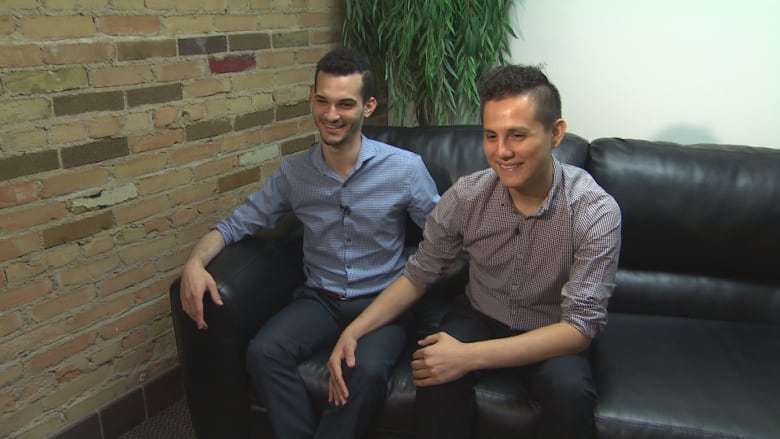'Have hope': Gay Egyptian wins refugee status, has advice for other LGBT claimants
Samer Habib, 23, applied for refugee status in February and was approved on Friday

After a months-long application process that culminated in a 15-minute adjudication, Samer Habib's refugee application has been approved.
The 23-year-old man from Egypt applied for refugee status in February, afraid for his life if he returned to his home country because he is gay.
On Friday, Habib and an adjudicator from B.C. completed the final questioning and the adjudicator told him her answer — yes.
"It was amazing. I was ecstatic," Habib said, sitting next to his boyfriend, Giovanny Penner. "We started crying and we hugged each other, and everyone in the room started getting emotional."
Penner, who waited outside the room before being called in to hear the decision, said he was trembling when it was delivered.
"We're definitely going to be sleeping well tonight," he said. "We've been up long nights, sleepless nights, with the case. Definitely we will be enjoying our rest tonight, that's for sure."
Habib said he hopes other LGBT refugee claimants like him know
His case was the first in the province to be processed since new guidelines for evaluating LGBT refugee claimants were brought in for the Immigration and Refugee Board of Canada, said his lawyer, Bashir Khan.
Khan has called the new guidelines "revolutionary."
"It really brings the concept of human rights right into an adjudicative refugee hearing that was perhaps not there [before] … because it recognizes and acknowledges the particular vulnerability that LGBTQ refugees face as opposed to straight people," Khan said.
For that reason, Khan said Habib's victory was a big moment for other LGBT refugee claimants, too.
"Yes, it is, because the system is working," he said.
'You deserve that level of respect'
Habib came to Canada about five years ago with a student visa and attended the University of Winnipeg. After graduating, he started working at the school with a work permit. He was set to apply to immigrate, but when it came to light he'd have to go back to Egypt to renew his passport — and serve three years mandatory military service — he applied for refugee status.
Homosexuality in private is not against the law in Egypt, but other laws have been used to prosecute gay men, Khan told CBC in February. In 2014, four men were sentenced to up to eight years in prison for "homosexual acts," the BBC reported at the time.
In 2016, Human Rights Watch reported that forced anal examinations are used regularly in the country in prosecuting homosexual sex.
When Habib applied, he said he didn't expect to get approved. After months of paperwork and meetings with lawyers, he said he was full of anxiety in the moments before walking into the room to begin his adjudication.
Once it began, he said the IRB adjudicator was respectful and professional, and, as per the new guidelines, didn't drill into intimate questions about his sexuality. He said the adjudicator seemed respectful, professional and fair.
Habib said he hopes other LGBT refugee claimants know they deserve the same respectful treatment.
"I'm very optimistic for next cases to come that people are going to be treated fairly in terms of their claims, and with respect," he said. "And that's what they should expect. Just because you're a refugee claimant doesn't mean you should be humiliated or degraded, but you deserve that level of respect from the decision-maker, and I'm glad to see that."
'Love always wins'
Habib also wants them to know there's help and support out there for them, and they should ask for it, if they need it.
"I'd like to say to other people in situations that might be like mine or similar, is that you just have to have hope," he said. "Trust yourself. When I first started, I didn't think that I was going to make it to this period, to the end, you know?"
"There's so many struggles throughout the way, people will tell you at the very beginning that you shouldn't be doing this, it's not the right thing. But you have to trust yourself and trust your guts."
Habib said he got invaluable help from supportive friends and community resources like the Rainbow Resource Centre.
After the long process, Habib and Penner planned to get a good rest on Friday and celebrate in earnest on Saturday.
From there, they hope to move in together and both plan to pursue further education.
"I just want to tell everyone, you know, they should be themselves," Penner said. "I know they will be scared, of course. There will be people, of course, that won't support them. But also there's going to be a tremendous amount of people that will support them, and will still love them no matter what. So saying that, of course, I believe that love always wins, you know?"